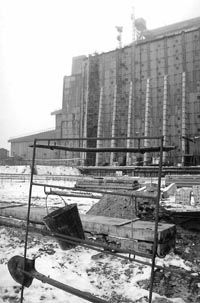With the Chornobyl nuclear power plant shut down the West will sleep easier, but the number of problems in Ukraine will not decrease

On December 5 in Verkhovna Rada an international parliamentary hearing on the problem of shutting down the Chornobyl nuclear power plant began (the only unit operative at the moment, the third reactor, is to be stopped on December 15 at noon).
Over forty representatives of foreign states and international structures, delegations of the Parliamentary Assembly of the Council of Europe and the European Commission, other high ranking foreign representatives, in particular, the premiers of Russia and Belarus, are taking part in the hearing on shutting down the Chornobyl Nuclear Power Plant (CNPP). Last week the participants of the hearing visited the cities of Chornobyl, Slavutych and Prypiat. The delegation also called on the Cover (the sarcophagus over the ruined fourth reactor), and placed flowers on the graves of the workers of the power plant and Chornobyl firemen who perished during the tragedy. One of the biggest problems that Ukraine will face after closing the CNPP is shortages in power supply. As was pointed out at a press conference held by the Greens, in the fifteen years after the Chornobyl accident not one compensating power supplying unit has been put into operation in Ukraine. During the same period, Yevhen TUR states, the functioning power stations have used up to 70-80% of their capacity. For this reason it is clear that official Kyiv above all wants to attract the participation of the West in completing the nuclear stations in Khmelnytsky and Rivne.
Simultaneously, the government cannot forget that living people with families and children, needing jobs and money, work at the station to be shut down. As Volodymyr Komarov, personnel manager and deputy director general of the CNPP, stated on December 4 at a meeting with a delegation of Ukrainian lawmakers and foreign guests, by this time the workers of the power station already had proposals to move to Russia, Iran, and China. In his opinion, in case the station is shut down, the most qualified specialists could leave Ukraine and move to nuclear objects in other countries.
Mr. Komarov thinks that as a result of the fact that preparation of a professionally qualified specialist for the work at a nuclear power station costs that latter between fifty and 340 thousand dollars, it is necessary to retain the station’s operating personnel. However, the 2001 budget does not provide any financing for social protection of the station’s personnel in the sum of 30,366,000 hryvnias, maintenance of the infrastructure of Slavutych at 19,963,000 hryvnias, or construction projects in Slavutych at 40,457,000 hryvnias. According to Volodymyr Mayor Udovychenko, the number of the unemployed here in 2001 will reach to 2914 persons, which means 21% unemployment. Meanwhile the station continues to operate. The same day the output of the third reactor (of RMBK-1000 type) of the CNPP was raised to the nominal level.
The parliamentary hearings on Chornobyl Nuclear Power Plant Closure: Organizational and Legal Problems were preceded by a morning meeting between President Leonid Kuchma of Ukraine and foreign participants in the discussion. The President pointed out that the world community is slow in fulfilling the pledges it has taken with respect to the Chornobyl problem.
“It is sometimes difficult to understand the reason why the fulfillment of these pledges is being obviously and significantly slowed,” Mr. Kuchma said. He stressed Ukraine “has both the moral and legal right to see to it that our partners keep pace with Ukraine in adhering in practice to the principle of collective responsibility for the solution of the Chornobyl problem.” The head of state said he could not view as satisfactory the ongoing construction of replacement reactors at the Rivne and Khmelnytsky nuclear complexes. Mr. Kuchma reiterated that these power units still remain unfinished due to “the unduly long study of their economic and ecological feasibility” and overcomplicated loan issue procedure set by the European Bank for Reconstruction and Development.
The President also noted that Ukraine attaches “great importance” to the EBRD and European Commission initiative to offer a grant to make up for the fuel shortage from the day the Chornobyl Nuclear Power Plant (CNPP) is closed until the second Khmelnytsky Nuclear Power Plant unit has been commissioned. He expressed hope that the European Commission “will keep its promise” and make an early decision “on the mechanism of giving the fuel deficit compensation grant.”
The President pointed out that the very process of decommissioning the CNPP and turning the Shelter facility into an environmentally friendly system will require major funds. In addition, the head of state said, the CNPP closure “will further exacerbate” the social problems that will arise for plant personnel and residents of the town of Slavutych after the plant is closed.
Mr. Kuchma reminded the visitors that the CNPP accident had affected about 3.2 million people, with 8% of the Ukrainian territory being exposed to direct radiation hazards and about 110,000 residents evacuated from nearly 200 populated areas.
In this connection, the President stressed that Ukraine pins “great hopes” on international aid in solving the problems related to CNPP closure. “Our people have already paid too high a price for the accident that occurred through no fault of their own well before Ukraine was proclaimed an independent state,” Mr. Kuchma said, adding that Ukraine had never had any doubts about CNPP closure, although “economic difficulties stood in the way of making this decision.”
Stressing that on December 15 “the Ukrainian side will put the final touch to meeting its commitments under the 1995 Memorandum,” the President pointed out the worldwide importance of this event. the UN General Assembly intends to support Ukraine’s draft resolution on international recognition of the CNPP Closure Act.






